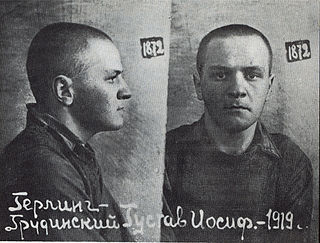Gustaw Herling-Grudziński
| Gustaw Herling-Grudziński | |
|---|---|

|
|
| Born | May 20, 1919 Kielce, Poland |
| Died | July 4, 2000 (aged 81) Naples, Italy |
| Occupation | Writer |
| Notable works | A World Apart |
| Notable awards | Order of the White Eagle |
Gustaw Herling-Grudziński (Polish pronunciation: [ˈgustaf 'herlink gru 'dʑiɲskʲi]; May 20, 1919 − July 4, 2000) was a Polish writer, journalist, essayist, World War II underground fighter, and political dissident abroad during the communist system in Poland. He is best known for writing a personal account of life in the Soviet Gulag entitled A World Apart, first published in 1951 in London.
Gustaw Herling-Grudziński was born in Kielce into a Jewish-Polish merchant family of Jakub (Josek) Herling-Grudziński and his wife Dorota (née) Bryczkowska. His mother died in 1932 of typhoid. His studies of Polish literature at the Warsaw University were interrupted by the invasion of Poland at the outbreak of World War II.
In late 1939 under the brutal occupation of Poland by Nazi Germany and the Soviet Union, Herling-Grudziński co-founded an underground resistance organization called Polska Ludowa Akcja Niepodległościowa, "PLAN".
He traveled to then Soviet occupied Grodno and in March 1940 was arrested by the NKVD by attempting to cross the Soviet-Lithuanian frontier and routinely sentenced to five years of hard labour on "espionage" charges like all Polish intellectuals. Imprisoned in Vitsebsk and two Gulag forced labor camps in Yertsevo and Kargopol in the Arkhangelsk region for 2 years, he was released in 1942 under the Sikorski-Mayski Agreement. He joined Gen. Władysław Anders' Army (Polish II Corps) and later fought in North Africa and in Italy, taking part in the battle of Monte Cassino. For his valor in combat he was decorated with the Virtuti Militari, Poland's highest military decoration.
...
Wikipedia
